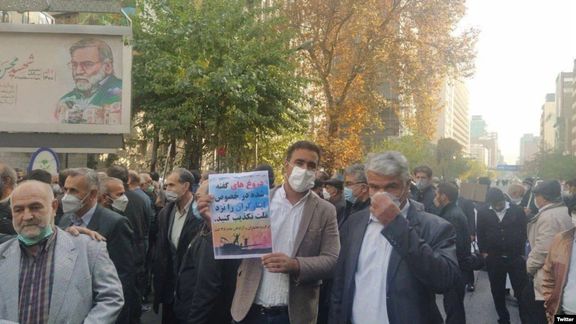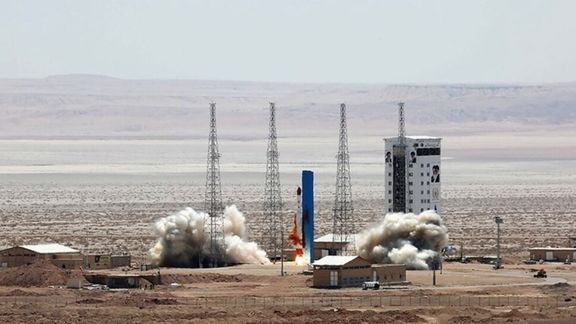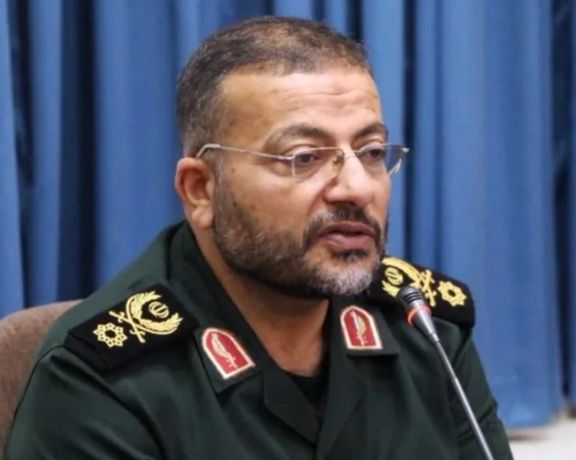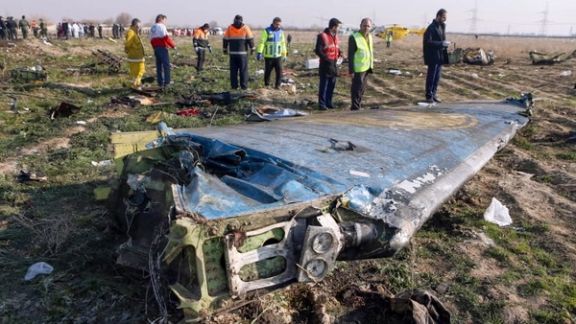War Veterans In Iran Protest Against Financial Hardship

Injured veterans of the 1980s Iran-Iraq war gathered in Tehran on Saturday to protest financial hardship and demand regular pension payments from the government.

Injured veterans of the 1980s Iran-Iraq war gathered in Tehran on Saturday to protest financial hardship and demand regular pension payments from the government.
The Islamic Republic upholds the eight-year war against Saddam Hussein’s Iraq as a symbol of its success and the religious devotion of Iranians, while many veterans live in poverty and complain of being ignored by a large government bureaucracy formed to serve them.
A video published on social media and some websites in Iran show hundreds of injured veterans protesting outside the Foundation for Martyrs and Veterans protesting for the late payment of their pensions. A speaker is heard asking the head of the Foundation, a government department, to resign if he cannot do his job.
The speaker also referred to powerful groups who present themselves as veterans and receive all sorts of government privileges, including business opportunities. Protesters were holding a banner that said, “It is enough to build power for yourselves on the bones of the martyrs”.
Many of the current leaders of the Islamic Revolution Guard Corps (IRGC) have reached high ranks and status because they served in the Iran-Iraq war.

State-controlled media in Iran have tried to explain why IRGC General Seyyed Javad Ghaffari, top commander in Syria had to leave that country in early November.
Etemad Online quoted the IRGC-linked news agency Tasnim as having reported that Ghaffari was seen off in Damascus after leading those forces for six years "following some developments in Syria," but did not elaborate on those developments. However, Tasnim acknowledged that according to "foreign news sources," Ghaffari was forced by the Syrian government to leave Syria after a visit to Damascus by the Foreign Minister of the United Arab Emirates, Sheikh Abdullah bin Zayed Al Nahyan's on November 9.
While Tehran has been portraying the development as an ordinary event, The Times of Israel on November 11 quoted Saudi sources as saying that Ghaffari was expelled from Syria as he was "accused of ‘major breach of Syrian sovereignty’ after attacking US forces, and deploying Iranian weapons to unapproved places."
According to the Times, It was reportedly Syria that shunned Iran's Qods Force Commander Javad Ghaffari for "nearly starting a war with Israel," and "almost causing an unwanted regional war."
The report published by the Times of Israel said that acting “contrary to instructions,” Ghafari led “a number of activities against the United States and Israel that almost led to the entry of Syria into an unwanted regional war, including the attack on American targets in Syria on October 20 by Iranian-backed militias.” The report said the move against Ghafari was taken by high-ranking officials in the Assad regime, after “months of disputes.”
Meanwhile, the Jerusalem Post reported that Syrian President Bashar al-Assad was behind the ousting of the top commander of the Iranian forces in Syria. The Post named Al-Arabiya news agency as its source for the report. The Jerusalem Post added that sources at the Syrian Presidential Palace had said that the palace deemed Ghaffari's behavior as a "violation of Syrian sovereignty."
Ghaffari was the third commander of the Iranian forces in Syria since 2011 when Iran began to intervene in Syria's civil war. He started his career in Syria as one of the commanders at the Iranian forces' headquarters in Damascus and later became the commander of the forces in Aleppo where he recently led Iranian forces as well as their Lebanese Hezbollah and Afghan mercenaries, the Fatemiyoun, Etemad Online reported in Tehran.
In an apparent attempt to undermine the news about Ghaffari’s expulsion, political commentator Massoud Assadollahi claimed in an interview with Etemad Online that Iran's presence in Syria has been more political than military in recent months. He also claimed that Ghaffari's mission to Syria had ended in 2020 but the killing of Qods Force Commander Qasem Soleimani delayed his return to Iran.
Meanwhile, Assadollahi characterized Ghaffari as a military adviser. This comes while during his mission to Aleppo, Ghaffari was nicknamed "the butcher of Aleppo," a title utterly far from being advisory. The commentator claimed that Ghaffari's role in Syria was one of "solving the Syrian people's problems," and that he was "a popular figure" in Aleppo.
Assadollahi further denied that Ghaffari was expelled from Syria, adding that according to diplomatic protocols he would have been given 48 hours to leave Syria if he was expelled, but he stayed in Syria for a month after the end of his mission. Some reports said that Ghaffari had his own private business in Syria.
According to the Jerusalem Post, the Saudi news channel Al-Hadath reported that the Syrians blamed the Iranians for taking advantage of Syria's natural and economic resources for their own gain and for evading tax payments to the Syrian regime.
Furthermore, Al-Hadath also revealed that Ghaffari admitted that he had stationed Iranian forces in places that were not approved by Syria.

Iran’s President Ebrahim Raisi visited a space exhibition in Tehran and asked officials to work on reaching the 36,000 km orbit around the earth in four years.
Minister of Communications and Information technology, Issa Zarepour, who supervises Iran’s space program told local media that the project to reach the high orbit was planned to be accomplished in 10 years, but Raisi asked to speed up the program. The president pledged all the assistance needed to help Iran’s Space Agency.
Although some of Iran’s attempts to launch satellites have failed, it currently has four satellites in low orbit. In April 2020, a military satellite called Nour 1 was launched.
In February, the defense ministry said it tested a new satellite carrier rocket for an orbit of less than 500 km.
The United States and other countries are concerned that Iran’s satellite program is a cover for developing ballistic missiles that can exceed the current 2,000 km range of Iranian missiles.
Zarepour also said that Raisi emphasized the need to commercialize Iran’s rocket and space capabilities by exporting expertise and engineering knowhow.

The general commanding Iran’s paramilitary Basij, said Thursday that his social media activists would be given equipment and technical support to boost their work.
Brigadier General Gholamreza Soleimani was speaking to Defa Press, news agency of the armed forces, two days after he told the Basij Digital Content Creation event in Tehran that a “people's network in cyberspace…means that the Iranian nation has deployed technology in the battlefield.”
In September Soleimani said that an “era of hit-and-run in cyberspace" was over and that the Basij needed a more systematic approach.
Ali Fadavi, deputy commander of the Revolutionary Guards Corps, which supervises the Basji, in a speech Wednesday warned Basij members of that the Islamic Republic is under attack and cultural “war…happening inside our houses and in the mobile phones in our pockets and our hands.” He called on them to "enter the battlefield."
Organized trolling has been for some time a feature of Iranian politics, helping to spread untruths and unsubstantiated allegations. Iranian authorities, including Supreme Leader Ali Khamenei refer to state-sponsored social-media activists as "cadets of the soft war.”
Iranian activists often allege that the IRGC and other state bodies sponsor organized trolls on social media to anonymously threaten, attack and discredit dissidents and to disseminate fake news.
The Basij has around 5 million members, according to leading academic authority Saeed Golkar, with around 200,000 cadres and special Basij, who can act as a paramilitary support to police and security forces. Thousands of members are active on social media to counter news, information and critical opinions disseminated on social-media including by Persian-speaking media abroad.
Besides maintaining extensive network of social media activists, the Islamic Republic also devotes an unknown measure of resources to control the Internet, block thousands of websites and ban foreign social media platforms such as Facebook, You Tube and Twitter. Almost every Iranian has to resort to VPNs and other tools to have access to blocked sites.
A recent study published by the Media Quarterly in Iran shows that the daily readership of Iranian newspapers and the audience of state television have plummeted dramatically during the past two years due to various factors including the loss of public trust, censorship and greater popularity of online media and social media as a source of news and information.
The Telegram messaging application, for instance − which is blocked but accessed through VPNs and anti-filtering software − has over 49 million users in Iran with at least 150 channels having, over 1 million subscribers. Instagram, which is not blocked, has a similar number of users. Many Iranian politicians and their supporters, including former principlist president Mahmoud Ahmadinejad, as well as a range of activists, have popular channels on Telegram and Instagram accounts.

The 2020 downing of a Ukrainian jetliner by Iran was the responsibility of high-level Iranian officials, not an accident as Tehran claimed, families of victims said in a report on Wednesday.
The report by an association composed of mostly Canadian families of Flight PS752 victims challenges Iran's official findings that blamed a misaligned radar and an error by the air defense operator for downing the plane shortly after it took off from Tehran's Airport in early morning on January 8 2020. All 176 people aboard were killed.
Iran for three days denied that the airliner was shot down and claimed it was an accident. After it acknowledged that two missiles fired 30 seconds apart had brought the plane down, it refused an independent investigation and tried to withhold information from Ukraine and Canada.
Iran's civil aviation body, which had responsibility for investigating the crash, said the operator mistook the jet for a missile at a time when tensions were high between Tehran and the United States. Hours earlier, Iran had fired ballistic missile at US bases in Iraq and was probably expecting a response.
A Canadian investigation in June which condemned "those responsible" but found no evidence that the tragedy was premeditated, but critics say that the country’s top leadership decided to leave the civilian airspace open at a time of high military tension on that day..
"It is the belief of the association that high-ranking officials of Iran are responsible for the downing of Flight PS752 and not just a handful of low ranking...members as per the claims of the government of Iran," the association report said.
"At the highest levels of military alertness, the government of Iran used passenger flights as human shield against possible American attacks, by deliberately not closing the airspace to civilian flights," it said.
Association president Hamed Esmaeilion told a virtual news conference: "We think that the downing of PS752 was a deliberate act."
The Iranian foreign ministry was not immediately available to comment.
The association said it based its report on public information and recordings of "high-ranking Iranian officials" among its sources and was prepared with assistance from aviation and legal experts.
It is not an official air crash accident report, which is designed to focus not on liability but how safety can be improved in the future.
The report said the missile system operator was experienced and should have been able to distinguish the jetliner from a cruise missile.
The trial of ten lower-level military personnel opened in Tehran on Monday. Many families in Iran refused to recognize the trial and protested outside the courtroom.
A Canadian government spokeswoman said the country is analyzing the report, which calls for an international investigation. Many of the victims killed in the crash were Canadian citizens or permanent residents.
Canadian Foreign Affairs Minister Melanie Joly tweeted on Tuesday that the country "stands with Ukraine" in its decision to not take part in PS752 hearings at a military court in Iran, calling for "transparency in the criminal proceedings."
With reporting by Reuters

A top commander of Iran's Guards has said Tuesday, “Enemies have concluded that if they fail to dominate us by 2025, they will never be able to inhibit Iran.”
Yadollah Javani, the political deputy to the chief commander of the Islamic Revolution Guard Corps (IRGC) also opined that the purpose of negotiations with Iran is to establish dominance.
“America today has reached the conclusion that confrontation with Iran is useless and intends to gain leverage through negotiations, tabling the issues of missiles and the nuclear [program], counting on soft power,” Javani said.
Meanwhile, Israel’s Finance Minister Avigdor Lieberman on Tuesday told a security conference that “With or without an agreement, Iran will be a nuclear state and have a nuclear weapon within five years, tops."
At the same time, the chief commander of IRGC, Hossein Salami said Tuesday that the Islamic Republic can dictate to the United States because, “Today’s America is much weaker than what it was 43 years ago,” and in balance of power, Iran is becoming equal to the US.
Salami is known for lofty statements, often claiming that the IRGC or the Islamic Republic have unparalleled power in the region and intimidate even the American military.